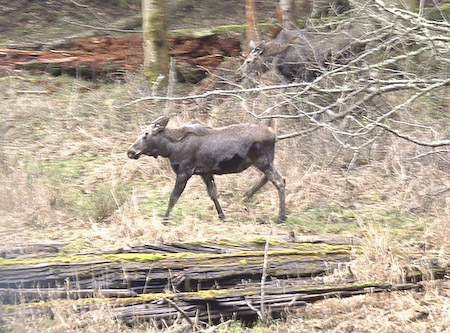|
OK, and now for the answer to the great Bark Scrape mystery: it was a
female MOOSE.

First of all, the scrapes being 3-4 feet off the ground and on a tree
5" in diameter would tend to rule out a deer antler rub, as deer
usually prefer to rub their antlers fairly low down on saplings.
If you take a close look at the photo, notice the bark is curled
upwards, indicating the scraping was done in an upwards motion. This
indicates it is a tooth scrape. Moose & deer do not have teeth on
the front of the upper jaw, so when they scrape things with their teeth,
it is always upwards.
Moose & deer are skilled at tree identification, and are very
picky about what species of tree they will scrape with their teeth. In
the area where this photo was taken (Vermont), moose prefer red maple,
striped maple, mountain maple, and mountain ash, while deer are almost
exclusive to hemlock. So with this photo being of a red maple, that
pretty much rules out deer.
Also, notice there are some saplings on the left side of the tree.
You can't see it in the photo, but there were additional scrapes on that
side of the tree. The orientation of the saplings was such that a bull
moose, which would still have his antlers, would not be able to get his
head in there to make those scrapes, hence it was a cow moose.
Moose tooth scraping is a bit of a mystery to biologists. It is
clearly an eating behavior, but tooth scrapes are few & far between,
so the bark is not a major food source. For this reason it is suspected
that the moose are seeking a micronutrient in the bark. Moose only
scrape tree bark in late fall, winter, and early spring, so it is
suspected that whatever micronutrient they are getting from the tree
bark is readily available in the aquatic vegetation they feed on at
other times of the year.
Was a great learning experience for me, hopefully for you all as
well.
Happy tracking,
Brian
|